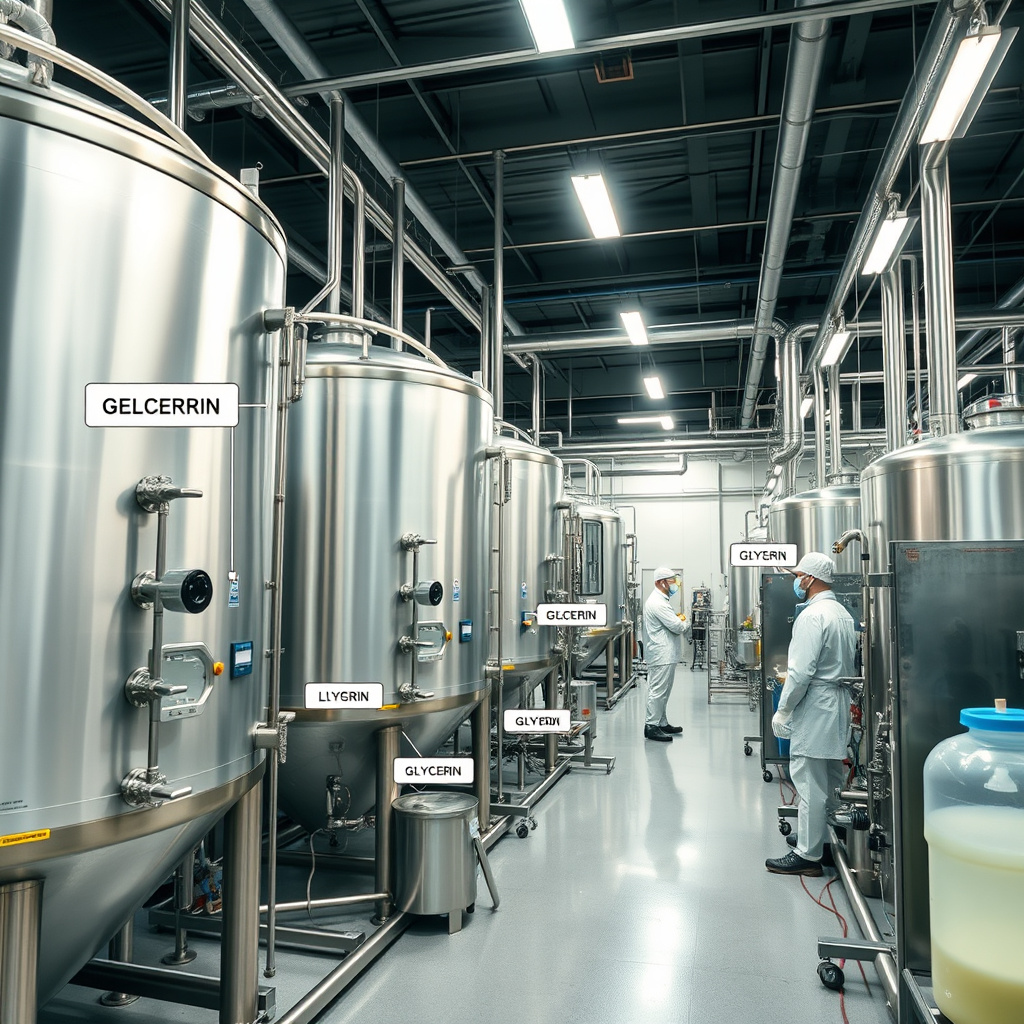How crude glycerin is processed into refined glycerin involves purification techniques that remove impurities, resulting in a high-quality product suitable for various applications.
Have you ever wondered how crude glycerin is processed into refined glycerin?
In this post, we will delve into the fascinating journey of glycerin from its raw form to a purified product.
You will learn about the essential methods used in this transformation and discover why this knowledge is crucial for companies seeking a reliable glycerin manufacturer and supplier.
The Journey from Raw to Refined: Understanding Glycerin Processing
The transformation of Glicerina Bruta into refined glycerin is a fascinating process that highlights the intricate relationship between raw materials and the final product we use in various industries, including cosmetics and food. This journey begins with the extraction of glycerin from natural sources, most commonly vegetable oils. The raw glycerin produced during this initial phase is a thick, viscous liquid that contains impurities and other components that must be removed for the glycerin to meet the high standards required for consumer use.
Initial Extraction and Composition
Initially, glycerin is extracted through hydrolysis or transesterification of fats and oils. This phase results in a mixture that includes fatty acids, soaps, and other by-products. At this point, the glycerin is still considered Glicerina Bruta and is not suitable for direct application in products. Understanding this composition is crucial as it impacts the subsequent refining process. The presence of these impurities can affect the clarity, odor, and overall quality of the final glycerin.
Refining Process: Steps to Purity
The journey from Glicerina Bruta to refined glycerin involves several crucial steps:
- Neutralization: The first step typically involves neutralizing the free fatty acids present in the raw glycerin. This is done using an alkaline solution, which helps to separate the glycerin from the unwanted components.
- Washing: Following neutralization, the glycerin undergoes a washing process to remove residual soap and impurities. This step is vital for improving the purity of the final product.
- Filtration: The filtered glycerin is then subjected to further purification. This may involve activated carbon or clay filtration, which helps in removing color and odor impurities.
- Distillation: Finally, the glycerin is distilled under controlled conditions. This process helps in achieving the desired purity level, making it suitable for various applications, such as in cosmetics and food products.
From Manufacturer to Supplier
Understanding the glycerin production process is essential for anyone looking to buy glycerin wholesale or source it from a reputable glycerin supplier. The final product, after its extensive refining process, is now ready for distribution. It can be used in a myriad of applications, from personal care products to food-grade solutions. When selecting a glycerin distributor, it’s important to consider the quality and purity of the glycerin offered. Top suppliers will ensure their products meet industry standards, providing customers with confidence in their purchases.
As we explore the different aspects of glycerin, it becomes clear that the journey from Glicerina Bruta to refined glycerin is not just a technical process but a testament to the importance of quality and safety in product manufacturing. In the current market, consumers are increasingly aware of the ingredients in their products, making the understanding of this journey more relevant than ever.
Key Stages in Glycerin Refinement: What You Need to Know
Understanding the journey of glycerin from its raw form to a refined product is essential for anyone involved in its production or usage. Glycerin, often referred to as Glicerina Bruta in its initial state, undergoes several critical stages to ensure that it meets the quality standards required for various applications, including cosmetics and food products.
Initial Processing of Raw Glycerin
The refinement process begins with the careful handling of Glicerina Bruta. This raw glycerin is typically a byproduct of biodiesel production or fat and oil processing. The first step involves separating impurities, which can include free fatty acids, salts, and other organic materials. This separation is usually achieved through a combination of physical and chemical methods, ensuring that the glycerin is primed for further purification.
Neutralization and Saponification
Once the initial impurities are removed, the next stage is neutralization, where acids present in the mixture are neutralized using alkali solutions. This process helps in eliminating any remaining contaminants that could affect the quality of the final product. Following this, saponification may occur, where any remaining fats are converted into soap and glycerin, further purifying the glycerin.
Filtration and Distillation
After neutralization, the glycerin undergoes filtration to remove any solid residues that may still be present. This step is crucial for achieving a clear and clean product. The filtered liquid then moves on to distillation, a key process that utilizes heat to separate glycerin from other volatile substances. Distillation is essential in producing high-purity glycerin, as it effectively concentrates the glycerin while removing unwanted components.
Dehydration and Final Purification
In the dehydration stage, water content is minimized to enhance the glycerin’s stability and shelf life. This is particularly important for glycerin intended for cosmetic or food applications, where moisture levels can significantly affect quality. The final purification stage may involve additional filtration or treatment with activated carbon to achieve the desired level of clarity and purity.
Quality Assurance and Packaging
After refining, the glycerin is subjected to rigorous quality assurance testing to ensure it meets industry standards. Manufacturers often work closely with a trusted glycerin supplier to ensure that the final product is safe for use in various applications. Once it passes all quality checks, the glycerin is packaged and made available for bulk purchase or distribution, ready to be used in cosmetics, food, and other industries.
In the current market, those looking to buy glycerin wholesale can find numerous options, including vegetable glycerin suppliers and chemical distributors. The refined glycerin stands out for its versatility and purity, making it an essential ingredient across multiple sectors. Understanding these key stages in glycerin refinement not only highlights the complexity of the process but also emphasizes the importance of quality at every step.
Innovative Techniques in Glycerin Refinement: A Modern Approach
In the world of glycerin refinement, innovation plays a crucial role in enhancing the quality and efficiency of production. As industries evolve, the methods used to transform Glicerina Bruta into high-purity refined glycerin have adapted to meet the growing demand for this versatile compound. Today, we explore some of the cutting-edge techniques that are redefining the glycerin production process.
Advanced Filtration Systems
One of the most significant advancements in glycerin refinement is the implementation of advanced filtration systems. These systems utilize membrane technology to separate impurities from Glicerina Bruta, resulting in a purer final product. By employing cross-flow filtration and ultrafiltration, manufacturers can achieve higher yields while minimizing waste. This not only boosts efficiency but also aligns with sustainability goals, making it a preferred method among leading glycerin suppliers.
Continuous Processing Techniques
Another modern approach gaining traction is continuous processing. Unlike traditional batch processing, which can be time-consuming and labor-intensive, continuous processing allows for the constant flow of materials through the refinement stages. This method significantly reduces production time and energy consumption, enabling glycerin manufacturers to respond more swiftly to market needs. In the present landscape, companies that adopt continuous processing often find themselves at a competitive advantage.
Use of Green Chemistry
As environmental concerns continue to rise, the incorporation of green chemistry principles into glycerin refinement is becoming increasingly prevalent. Techniques that minimize the use of hazardous substances and reduce environmental impact are now favored. For instance, using biodegradable solvents and catalysts not only enhances the safety of the glycerin production process but also appeals to eco-conscious consumers looking to buy glycerin wholesale for cosmetics and other applications.
Automation and Data Analytics
The integration of automation and data analytics into glycerin refining processes has revolutionized quality control and operational efficiency. By utilizing real-time monitoring systems, glycerin distributors can ensure consistent product quality and identify potential issues before they escalate. This data-driven approach allows for precise adjustments in the refining process, resulting in superior products that meet the stringent standards expected in various industries.
Collaboration with Suppliers
Lastly, fostering strong relationships with reliable suppliers is key to successful glycerin refinement. Whether sourcing raw materials or seeking innovative technologies, collaboration with reputable partners can lead to enhanced product offerings. A well-established glycerin chemical supplier not only provides high-quality materials but also shares insights on the latest trends and techniques in glycerin processing.
In summary, the glycerin refinement landscape is evolving rapidly, driven by innovative techniques that enhance quality, efficiency, and sustainability. By embracing these modern approaches, glycerin suppliers can meet the ever-increasing demand while ensuring they remain at the forefront of the industry.
Quality Control in Glycerin Processing: Ensuring Purity and Standards
The Importance of Quality Control
Quality control is a crucial aspect of glycerin processing, ensuring that the final product meets high standards of purity and safety. As glycerin finds applications in various industries, including cosmetics and food production, maintaining stringent quality parameters is essential. The journey from Glicerina Bruta to refined glycerin involves several critical steps that must be monitored to guarantee the quality of the end product.
Monitoring Purity Levels
To ensure that glycerin meets the required standards, manufacturers engage in rigorous testing throughout the processing stages. This includes regular sampling and analysis to check for contaminants or impurities. The tests commonly performed include:
- Chemical Analysis: This involves assessing the chemical composition to confirm that the glycerin aligns with industry specifications.
- Microbial Testing: Ensuring that the glycerin is free from harmful bacteria and pathogens is vital, especially for products intended for consumption or skin application.
- Physical Properties Assessment: Evaluating the viscosity, color, and odor helps maintain consistency in product quality.
Adhering to Industry Standards
Glycerin manufacturers must abide by specific regulations and standards set by health and safety authorities. These guidelines dictate the acceptable levels of impurities and the necessary testing protocols. For suppliers aiming to distribute glycerin for cosmetics or food use, compliance with these standards is non-negotiable. By prioritizing quality control, glycerin suppliers can build trust with their customers, ensuring that they are buying glycerin wholesale that is safe and effective.
Innovation in Quality Control Techniques
In the present day, advancements in technology have transformed quality control processes in glycerin production. Automated systems monitor production in real-time, allowing for immediate adjustments if any parameters deviate from the norm. This not only enhances efficiency but also minimizes the risk of producing subpar products. Many glycerin distributors are adopting these innovative techniques, ensuring that they can consistently deliver high-quality glycerin to meet market demands.
The Role of Experienced Personnel
Despite the advancements in technology, the human element remains essential in quality control. Skilled technicians and quality control specialists are vital in interpreting data and making informed decisions regarding glycerin refinement. Their expertise ensures that the processing adheres to the highest standards, providing an additional layer of assurance for customers seeking the best glycerin supplier.
Conclusion of Quality Assurance
As the glycerin production process continues to evolve, the focus on quality assurance remains steadfast. From the careful monitoring of Glicerina Bruta at the outset to the final purification stages, quality control is integral to producing a product that meets the needs of various industries. By committing to rigorous testing and adhering to industry regulations, glycerin manufacturers can confidently supply high-quality glycerin, whether for cosmetics, food, or other uses. Quality control is not just a process; it is a promise to consumers that they are receiving a safe, effective product.
Applications of Refined Glycerin: Beyond the Basics
Refined glycerin has come a long way from its humble beginnings as a byproduct in the soap-making process. Today, its versatility spans across various industries, demonstrating that this clear, odorless liquid is much more than just a simple ingredient. In the current landscape, refined glycerin is increasingly recognized for its multifaceted applications, from personal care to food production, and even in pharmaceuticals.
Personal Care and Cosmetics
One of the most prominent uses of refined glycerin is in the cosmetics industry. Its ability to act as a humectant makes it a favorite among glycerin suppliers catering to beauty brands. It draws moisture from the air into the skin, providing hydration and maintaining a healthy skin barrier. Products like lotions, creams, and serums often list glycerin as a key ingredient due to its skin-soothing properties. Consumers today are more aware of ingredient transparency, leading to an increased demand for glycerin for cosmetics that is both effective and derived from sustainable sources.
Food Industry Applications
In the food sector, refined glycerin plays a crucial role as a sweetener, preservative, and humectant. It helps maintain moisture in baked goods, ensuring they remain soft and enjoyable for longer periods. As a food grade glycerin supplier, many companies focus on providing this ingredient to meet the growing consumer interest in natural and clean-label products. Its ability to enhance flavor while reducing sugar content appeals to health-conscious consumers who are looking for alternatives to conventional sweeteners.
Pharmaceuticals and Health Products
The pharmaceutical industry has also embraced refined glycerin, utilizing its properties in various formulations. It serves as a solvent, a sweetening agent in syrups, and even as a carrier for active ingredients. The demand for high-quality, pure glycerin is critical in this sector, making reliable glycerin distributors essential partners for pharmaceutical companies. This trend highlights the importance of sourcing glycerin from trusted manufacturers to ensure product safety and efficacy.
Industrial Uses
Beyond consumer products, refined glycerin finds applications in industrial processes. It is used as a lubricant and plasticizer in manufacturing, providing enhanced flexibility and durability to materials. The versatility of glycerin extends to being a key component in the production of biodiesel, where it is a byproduct of the transesterification process. This aspect of glycerin production showcases its role in supporting renewable energy initiatives and sustainable practices.
Innovative Uses in Emerging Markets
As industries evolve, innovative uses for refined glycerin continue to emerge. In recent times, there has been a growing interest in its application in 3D printing and bio-plastics, where it serves as a biodegradable alternative to traditional petroleum-based products. Such advancements illustrate the ongoing relevance of glycerin in adapting to new market demands, making it an exciting area of exploration for both glycerin chemical suppliers and manufacturers.
With its broad range of applications and a focus on sustainability, refined glycerin is carving out a significant niche in the marketplace. As consumers and industries alike prioritize quality and ethical sourcing, the journey from Glicerina Bruta to refined glycerin demonstrates not only the importance of this chemical compound but also its potential to impact various sectors positively. As we move forward, the ongoing exploration of glycerin’s capabilities will undoubtedly lead to even more innovative applications and opportunities.
Choosing the Right Manufacturer: What to Look for in Glycerin Suppliers
Finding the right glycerin supplier is crucial for businesses looking to ensure quality and reliability in their products. As you navigate the landscape of glycerin manufacturers, there are several key factors to consider that can help you make an informed choice.
Understanding Your Needs
Before delving into potential suppliers, it’s important to clearly define your specific needs. Are you looking for food grade glycerin for culinary applications, or perhaps glycerin for cosmetics? Identifying your requirements will guide you in selecting a supplier that specializes in the type of glycerin you need.
Assessing Quality Standards
Quality is paramount when it comes to sourcing glycerin. Look for suppliers who adhere to stringent quality control measures. A reputable glycerin manufacturer should provide documentation that outlines their quality assurance processes. This includes information on how they maintain the purity of their products throughout the glycerin production process. Consider asking for certificates of analysis to verify that the glycerin meets industry standards.
Production Capabilities
Evaluate the production capabilities of potential suppliers. A reliable glycerin distributor should have the capacity to handle your order size, whether you are looking to buy glycerin wholesale or making a glycerin bulk purchase. Additionally, inquire about their production techniques and whether they implement any innovative methods to enhance the quality of their glycerin.
Experience and Reputation
Experience often translates to reliability. Research the supplier’s history and reputation within the industry. Reviews, testimonials, and case studies can provide insight into their customer service and product quality. A well-established vegetable glycerin supplier with positive feedback from clients is likely to be a safer choice.
Regulatory Compliance
In today’s market, regulatory compliance is more important than ever. Ensure that your chosen supplier complies with local and international regulations regarding glycerin production. This not only assures quality but also protects your business from potential legal issues down the road.
Customer Support and Communication
Effective communication is key to a successful partnership. Choose a supplier that is responsive and willing to address your questions or concerns. Having a dedicated account manager or customer support team can greatly enhance your experience and ensure smooth transactions.
Pricing and Flexibility
While cost is always a consideration, it should not be the sole factor in your decision-making process. Compare pricing among different glycerin suppliers, but also weigh the value you receive in terms of quality, service, and reliability. Look for suppliers who offer flexible terms, which can be beneficial for businesses that experience fluctuating demand.
Conclusion
By taking the time to thoroughly evaluate potential glycerin suppliers, you can make a well-informed decision that aligns with your business needs. Remember, the right manufacturer will not only provide high-quality glycerin but also become a reliable partner in your business journey.






